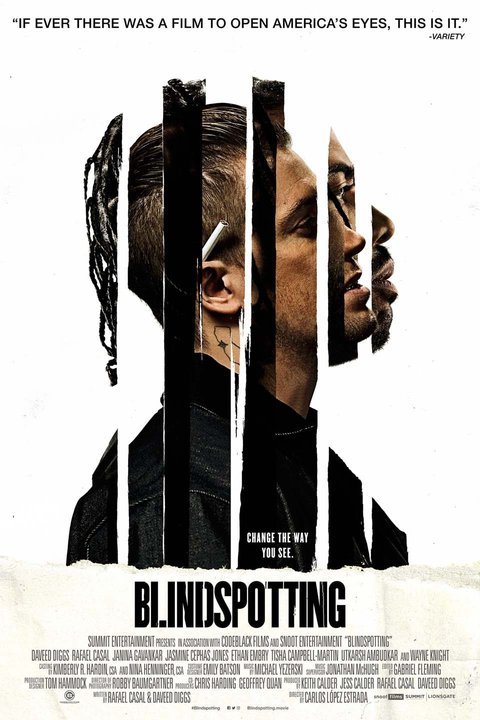
Blindspotting
- R
- 1h 35min
- 18 January 2018
- Director: Carlos López Estrada
- Starring: Daveed Diggs, Rafael Casal, Janina Gavankar
A police shooting tests the bond between a man on probation and his volatile best friend.
Compatible content providers

Blindspotting is a movie about two lifelong friends in a rapidly gentrifying Oakland, California, whose relationship is challenged and tested after one of them witnesses the fatal police shooting of an unarmed black man.
Directed by Carlos López Estrada and co-written and starring Rafael Casal and Daveed Diggs, Blindspotting received the year's Dolby Institute Fellowship. The grant supported the filmmakers in augmenting the sound design and mixing the film in Dolby Atmos®.
Administered by the Dolby Institute, the grant allowed the filmmakers to explore and express the importance of sound in telling this complex story. “The sound changes and evolves from the first day [of the story] to the second day to the third day,” said Estrada. “And the music you hear, the sounds you hear, the city around it changes as these characters are learning more and more about what’s going on.”
There are so many moments in the film that don’t have any dialogue, any words. All you’re getting to experience is what Collin is getting to experience, by hearing what he’s hearing, feeling what he’s feeling. Sound became the secondary form of speech of the movie.
CARLOS LÓPEZ ESTRADA, DIRECTOR, BLINDSPOTTING
“We picked Blindspotting to receive the Fellowship because it uses sound in a distinctive way to get into the minds of the characters,” explained Dolby Institute Director Glenn Kiser. “Daveed’s character, Collin, is clearly suffering from a kind of PTSD, and Carlos uses sound in a really dramatic and effective way to put the audience inside Collin’s head by warping and shifting the sounds he hears.”
“When we first heard about the Dolby grant we thought, that’s interesting, because this is not what I would consider a Dolby Atmos applicable film, necessarily,” said supervising sound editor and rerecording mixer Andy Hay, whose previous films include The Florida Project. “I mean, you think of big sci-fi movies or action movies where there’s tons of opportunity to move sounds within space. But there are ways to use the [Dolby Atmos] system that are subtle to introduce the sense of space in a manner that is not particularly obvious. It’s not just for flybys and helicopters and spaceships; it can be used for everything.”
We have moments where all the sound goes away and all we hear is Collin’s breathing, or one very distinct thing, or just the hum of a red light. That’s the only thing we hear, and it gives you this incredible experience of focus, and then complete awareness.
RAFAEL CASAL, CO-WRITER AND ACTOR, BLINDSPOTTING
Hay went on to explain how the sound design of the film almost works in a musical way to give the audience an emotional experience. “What we’ve done thematically in the cop shooting — we’ve used a very few specific sounds that we then carry forward and use as anchor points that we can relate back to, sort of like a symphony has motifs to hear later, and they recur, and they’re upside down, inverted, backwards, whatever. Those harken back to that initial horrific shooting moment.”
Blindspotting was released by Lionsgate in July 2018. It was nominated for several awards including the Grand Jury Prize at the Sundance Film Festival and was named as one of the Top Ten Films by both the African-American Film Critics Association (2018) and the Austin Film Critics Association (2019). Blindspotting is and now is available on streaming platforms in Dolby Atmos.
As Collin descends into this nightmare, it’s another way to think about gentrification, where the sounds you’ve heard your whole life all of a sudden take on a different feeling.
DAVEED DIGGS, CO-WRITER AND ACTOR, BLINDSPOTTING


